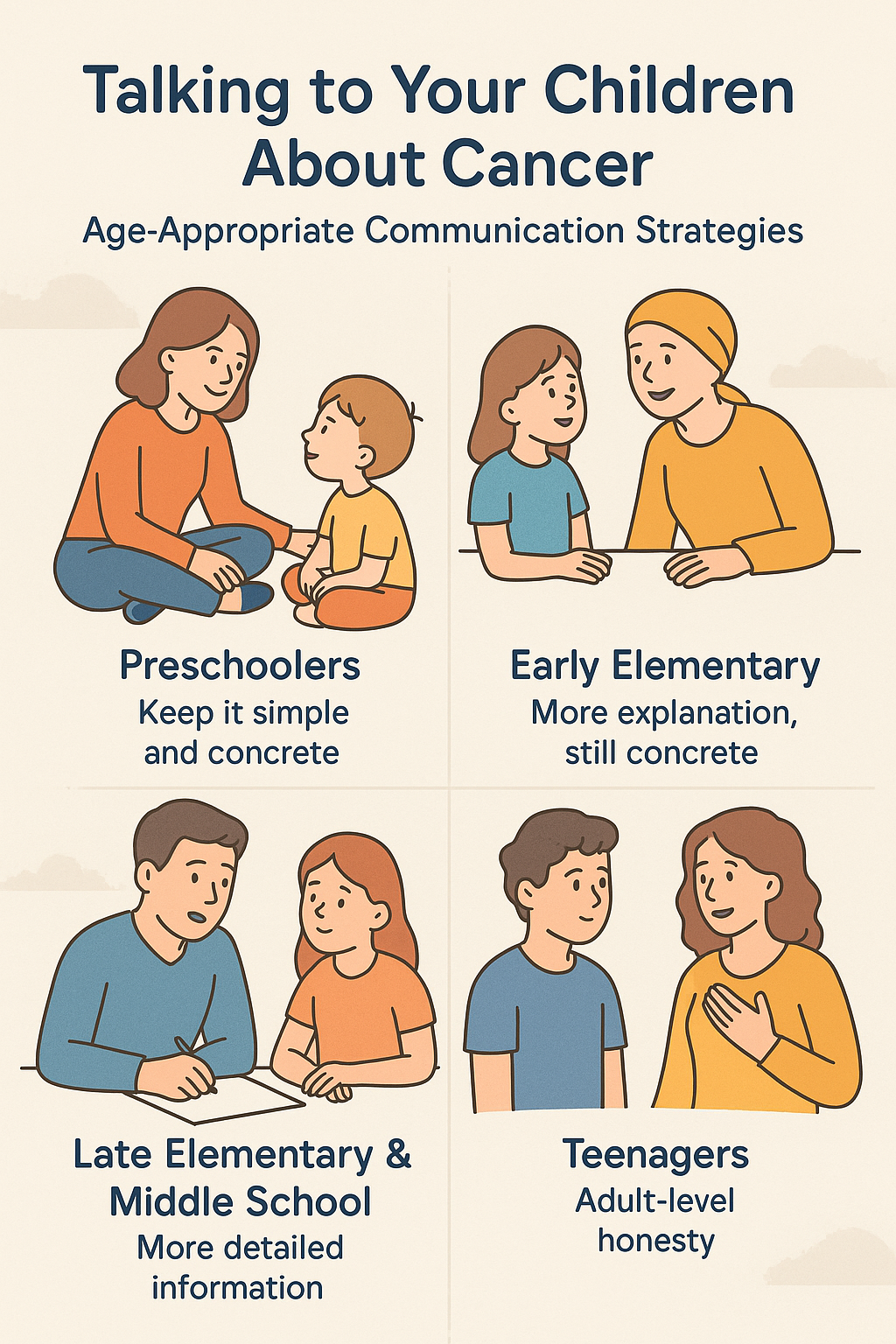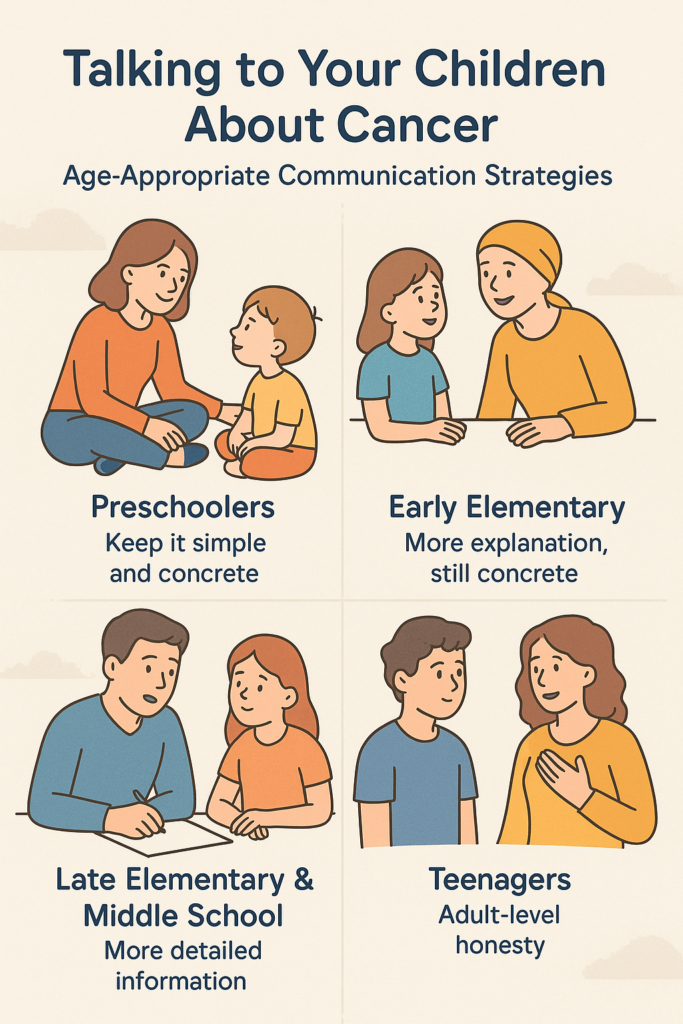Book Appointment Now

Talking to Your Children About Cancer: Age-Appropriate Communication Strategies When You or a Loved One Has Cancer
Introduction
When cancer enters a family’s life, it impacts everyone, including children. Deciding how and when to talk to children about a cancer diagnosis – whether it’s your own, a partner’s, a grandparent’s, or another close loved one’s – can feel daunting. However, open and honest communication, tailored to their age and understanding, is crucial for building trust, alleviating fears, and helping them cope with the changes.
This article offers age-appropriate strategies to guide these difficult, but necessary conversations.

Why Honesty is Important:
Children are often more perceptive than we realize. Sensing that something is wrong, they may fill in the blanks with their own anxieties, which can be far more frightening than the truth, presented gently. Honest communication, delivered in a way they can understand, helps them feel included, secure, and better equipped to process the situation.
Age-Appropriate Communication Strategies:
Preschoolers (Ages 3-5): Keep it Simple and Concrete
- What to tell them: Use simple words like “sick,” “medicine,” and “tired.” Explain that the doctors are trying to help the person get better. Focus on the immediate changes they might notice, such as someone being more tired or having different routines.
- How to talk: Use short sentences and concrete examples. For instance, “Mommy is sick, and the medicine might make her hair fall out, but it will help her get stronger.”
- Focus on feelings: Acknowledge their feelings. If they seem sad or confused, say, “It’s okay to feel sad when someone you love is sick.” Offer comfort and reassurance.
- Reassurance: Emphasize that they are not to blame for the illness and that they will continue to be loved and cared for.
Early Elementary (Ages 6-8): More Explanation, Still Concrete
- What to tell them: You can introduce the word “cancer” simply, explaining it as “a sickness in the body.” Explain that doctors have special ways to treat it, like medicine or special machines. Be honest but avoid overwhelming details.
- How to talk: Answer their questions honestly and directly, but keep your explanations brief. Use analogies if helpful, like comparing cancer cells to “weeds” that doctors are trying to remove.
- Address fears: They might worry about catching cancer. Reassure them that it’s not contagious in the way a cold is. They might also fear the person will die. While you can’t guarantee the future, focus on the present and the efforts being made for treatment.
- Involve them: If appropriate, involve them in small ways, like helping to choose a comforting blanket or drawing a picture for the person who is sick. This can help them feel like they are contributing.
Late Elementary and Middle School (Ages 9-13): More Detailed Information
- What to tell them: You can provide more details about the type of cancer and the treatment involved. Explain that cancer is when some cells in the body grow in a way they shouldn’t. Be prepared for more complex questions about how it happens and what the chances of recovery are.
- How to talk: Use accurate language, but avoid overly technical jargon. Be honest about the seriousness of the situation while also emphasizing hope and the efforts of the medical team.
- Address their concerns: They might worry about changes in the family routine, their own health, or the possibility of loss. Validate their feelings and provide clear information to address their specific concerns.
- Offer ways to help: Encourage them to express their feelings through talking, writing, or art. They might also want to help in practical ways, like helping with chores or spending time with the person who is sick.
Teenagers (Ages 14+): Adult-Level Honesty
- What to tell them: Teenagers are capable of understanding more complex information about cancer, including the prognosis. Be honest about the situation, but tailor the level of detail to their maturity and desire for information.
- How to talk: Treat them with respect and involve them in discussions if they wish. Be prepared for difficult questions and don’t be afraid to say, “I don’t know, but we can find out together.”
- Acknowledge their emotions: They may experience a wide range of emotions, including anger, sadness, and fear. Validate their feelings and offer support.
- Respect their boundaries: Some teenagers may want to be very involved, while others may need more space. Respect their individual coping mechanisms. Connect them with support groups for teens affected by cancer if they are open to it.
General Tips for All Ages:
- Be Honest: Always strive for honesty, even when it’s difficult. Evasiveness can breed mistrust and anxiety.
- Be Patient: Children process information at their own pace. Be prepared to revisit the conversation multiple times and answer the same questions repeatedly.
- Listen Actively: Pay attention to their questions and concerns. What they ask might not be exactly what they are worried about.
- Validate Feelings: Let them know that their feelings are normal and okay. Avoid dismissing their fears or telling them not to be sad.
- Reassure Them: Continuously reassure them that they are loved and safe, and that the adults in their lives are doing everything they can.
- Maintain Routine: As much as possible, try to maintain familiar routines to provide a sense of stability and normalcy.
- Seek Support: Don’t hesitate to seek guidance from child psychologists, social workers, or support groups specializing in families dealing with cancer. They can offer valuable advice tailored to your specific situation.
Conclusion:
Talking to children about cancer is never easy, but open and age-appropriate communication is essential for their emotional well-being. By being honest, patient, and attuned to their needs, you can help them navigate this challenging time with greater understanding and resilience. Remember that you are not alone, and seeking support for yourself and your children is a sign of strength.



